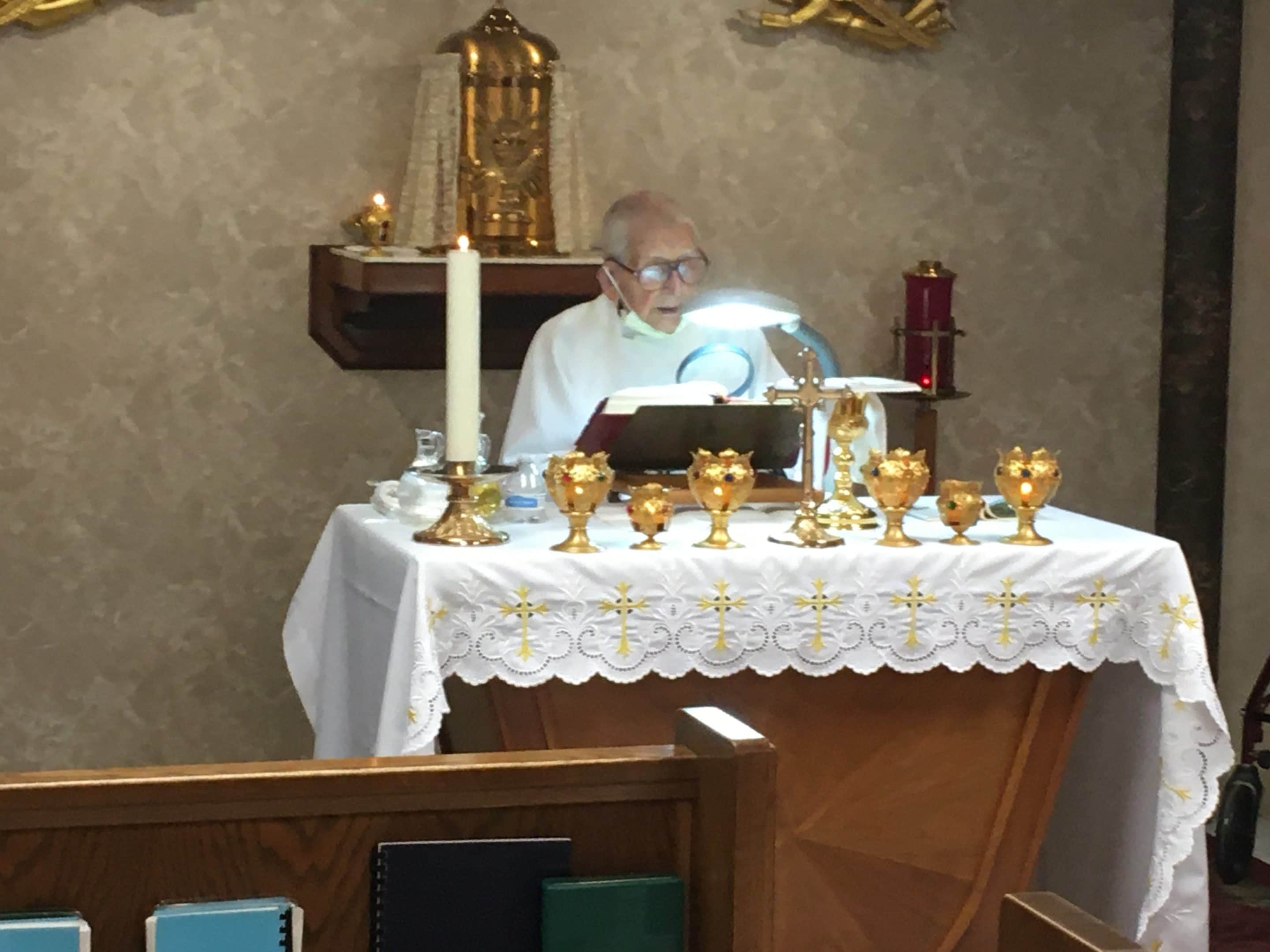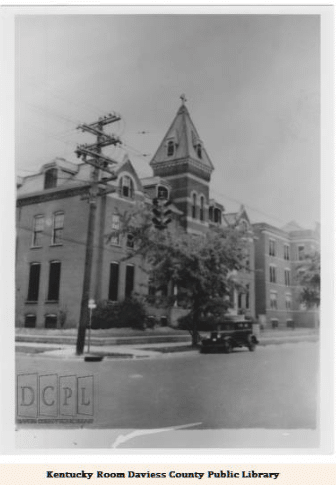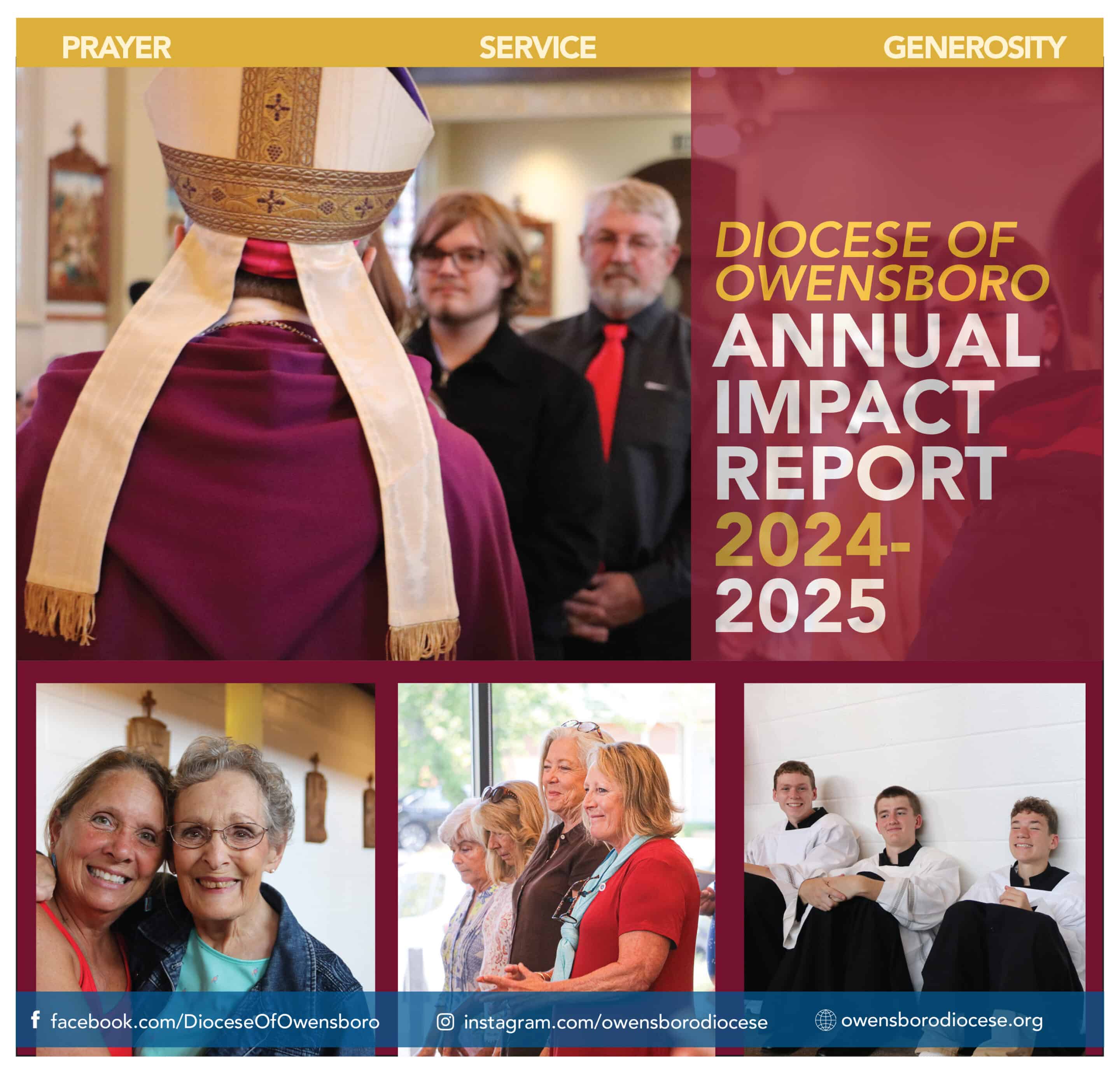
Msgr. George Hancock celebrates a private Easter Sunday Mass 2020 in the oratory (convent chapel) of the Carmelite Sisters in Owensboro. Due to the COVID-19 pandemic, public Masses were suspended at the time, so the Mass was only for those inside the convent. COURTESY OF CARMEL HOME
‘Keep up a good spiritual life…’ 102-year-old priest advises clergy and other Church ministers
BY SR. MARIA CARMELITA NAVARRO, DCJ, AND ELIZABETH WONG BARNSTEAD, THE WESTERN KENTUCKY CATHOLIC
It’s been a whole year since Msgr. George Hancock celebrated a private Easter Sunday Mass on April 12, 2020, in the oratory (convent chapel) of the Carmelite Sisters in Owensboro.
Due to the COVID-19 pandemic, public worship was suspended at the time, so the Mass was only for those inside the convent, a ministry Msgr. Hancock provided from April 3-June 20.
The small, private Mass was a powerful moment not unlike other varied experiences that Msgr. Hancock – who turned 102 on Feb. 2, 2021 – has encountered throughout his more than seven decades of priesthood.
In light of his recent birthday, Msgr. Hancock recently shared some of his favorite memories with The Western Kentucky Catholic.
Finding the keys
Many, many years ago, Msgr. Hancock, who was working in the Owensboro chancery at the time, received a Saturday night phone call that the pastor of St. Romuald Parish in Hardinsburg had been rushed to the hospital in Louisville for a heart attack.
The bishop told then-Fr. Hancock that he would need to fill in at the Masses the following morning. The young priest obliged, but then encountered a problem.
“In those days it was hard to get into the church because the priest had all the keys” and the lay staff did not, said Msgr. Hancock, who today resides at the Carmel Home in Owensboro.
He drove to see the pastor of nearby St. Mary of the Woods Parish in McQuady – obviously, no one had cell phones in those days – to see if the pastor knew of any secret outdoor hiding spots for spare keys at St. Romuald.
“And he said yes, there’s one right above the front door, and if you see it, you can get it,” remembered Msgr. Hancock. “And that’s how I got in!”
Of course, it’s much different now: “Somebody’s always got the keys and can unlock it for you,” he said.
The priesthood is “interesting; you have to be open to whatever comes,” said Msgr. Hancock.
High school teacher

Left to right: Msgr. George Hancock (teacher), Joan Englert, DB Blanford, Marjorie Howard, Tom Englert, Lucille Rose, Martin Bumm, Margerie Hardesty, and Juanita Clark. (Not pictured is Anna Scheidegger; also not pictured is Bettie Hall who recently passed away). COURTESY OF CARMEL HOME
Msgr. Hancock’s multiple roles in the Diocese of Owensboro have included serving as diocesan chancellor, pastor of many parishes, and teacher at St. Francis Academy in Owensboro – today known as Owensboro Catholic High School.
In fact, one could say that every day is a class reunion for Msgr. Hancock and nine of his former students – the class of 1951 – who also live at the Carmel Home. This class was the last to graduate before St. Francis Academy changed names.
“I taught four years at St. Francis, and then one year after it became Owensboro Catholic in 1952,” said Msgr. Hancock. “I started teaching in fall of ’47. So, ’47, ’48, ’49 and ’50.”
Then-Fr. Hancock taught Latin, health and physical fitness, economics, and English. He intended to study biology so that he could teach that as well – and then Bishop Francis R. Cotton sent him to the Pontifical Lateran University in Rome to study canon law and ultimately become a canon lawyer.
The bishop told the young priest that he would be paying for his own tuition, but it wasn’t a great sacrifice: at the time, it only cost $5 a year for priests and seminarians to study there.
Change of roles
Several years later in 1963, when Fr. Hancock was assigned to St. Joseph Parish in Leitchfield, Fr. Robert Connor, the diocesan chancellor at the time, died suddenly. The bishop at the time, Bishop Henry J. Soenneker, was in Rome attending the Second Vatican Council, but returned home for Fr. Connor’s funeral.
“On his way back, he wrote me a letter that said ‘It’s four o’clock in the morning, and I’m writing you this letter to make you chancellor of the diocese,’” said Msgr. Hancock.
The date is seared in his mind. He arrived for his first day of work as the chancellor on Monday, Nov. 18, 1963. And Friday of that first week, President John F. Kennedy was assassinated in Dallas.

St. Francis Academy before its name changed to Owensboro Catholic High School. COURTESY OF DAVIESS COUNTY PUBLIC LIBRARY
The chancellor role was a hefty one, but Bishop Soenneker knew it would be in good hands.
“When you’re the chancellor you’re dealing with the priests and the laypeople primarily,” said Msgr. Hancock. “There are 32 counties in western Kentucky and you’re dealing with all of those people. And the priests have their own problems, their own things that they’re concerned about, and they come to chancery to get instructions, get help with whatever they need.”
Msgr. Hancock said he perfected the art of “listening” when people would come to him with their concerns.
“That’s a really important thing,” he said. “And they see that you accept them; you pay attention to them. And in that way you’re able to make contact with them and help them. You just listen to what they have to say.”
Msgr. Hancock also said that anyone who works for the Church, especially the clergy, should “be sure you keep up a good spiritual life.”
For instance, in handling the diocese’s money matters, “it’s easy to get involved in all that business stuff and forget that you’re a priest and forget that you’ve got an obligation to the good Lord and to his Church and to the people, to be a good Catholic priest who really loves and serves God,” said Msgr. Hancock.
“That’s a really important thing to develop,” he said. “It’s important as a pastor too because when you become a pastor, there are a lot of obligations with taking care of people.”
Overall, Msgr. Hancock does not think a whole lot about reaching the age of 102.
“The Lord’s let me for whatever reason,” he said.
Originally printed in the April 2021 issue of The Western Kentucky Catholic.

